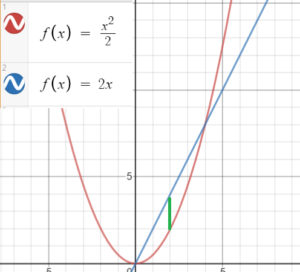A conjugate function is defined as:
![]()
This classical optimization tool represents the maximum gap between a function and its slope (Charpentier, 2020). It represents the supremum (assuming one exists) of a family of affine functions (Gorni, 1989).
Conjugate Function: Intuitive Examples
The conjugate function for the negative logarithm f(x) = -log x is (Fu, 2020):

Graphically, the one-dimensional case of a conjugate function is fairly easy to visualize:
- Graph the function f and slope y.
- Look along the x-axis to find the point with the maximum distance between the graph of f and the line g(x) = yx.
- Define a new function with slope y that passes through the point (x*, f(x*)).
For example, the linear function f(x) = x2/ 2 has a derivative of f′ = 2x. The maximum gap between these two functions is at f(2):

Formal Definition
The following property is used to define a conjugate function:
F*(y) = supx≥0 (xy − f(x)).
f*(y) = sup
f*(x) is always convex, even if the original function isn’t.
References
Graph of conjugate function: Desmos.com.
Brown, J. & Churchill, R. (1996). Complex variables and applications (6th ed.). New York: McGraw-Hill.
Charpentier, A. (2020). On the conjugate function. Retrieved November 12, 2020 from: https://www.r-bloggers.com/2020/01/on-the-conjugate-function/
Fu, A. (2020). EE364a: Lecture Slides.
Gorni, G. (1989) Conjugation and Second-Order Properties of Convex Functions. Journal of Mathematical Analysis and Applications, 158. pp. 293-315.
Vujanovic, B. & Jones, S. (1989). Variational Methods in Nonconservative Phenomena, Mathematics in Science and Engineering.
Vandenberghe, L. (2019). Conjugate Functions. Retrieved November 12, 2020 from: http://www.seas.ucla.edu/~vandenbe/236C/lectures/conj.pdf